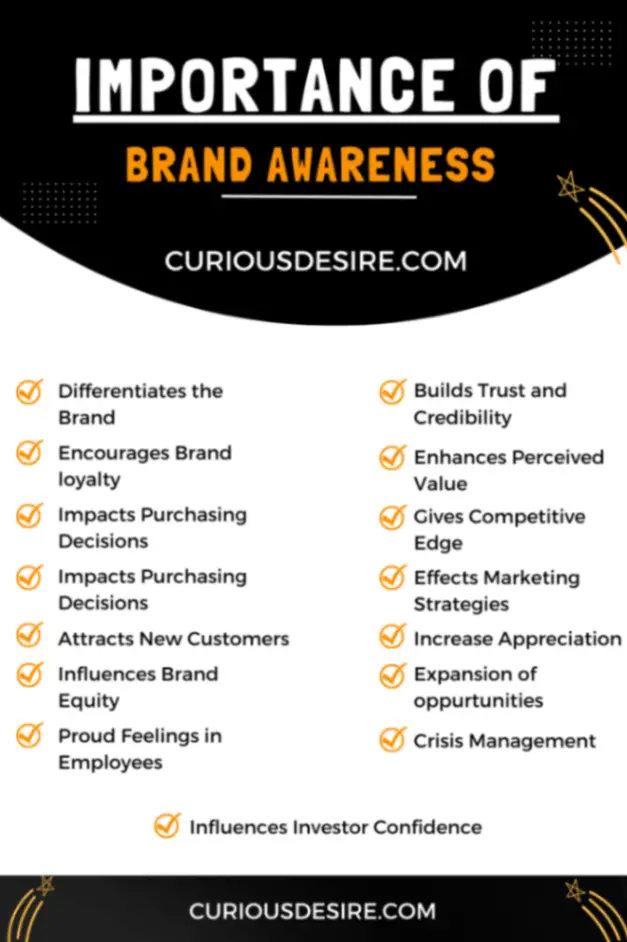In today’s competitive business landscape, brand awareness plays a pivotal role in the success of any company.
Brand awareness isn’t just a buzzword marketers throw around; it’s the heartbeat of a thriving business. Building brand awareness is essential for not only driving sales but also for establishing trust and loyalty among customers.
Let’s find out why brand awareness is not just important but essential for any brand looking to carve its name in the hearts and minds of consumers.
Here are the 5 most common reasons for the importance of brand awareness:
- Builds Trust and Credibility
- Encouraging Brand Loyalty
- Crisis Management
- Influences Investor Confidence
- Expansion of Opportunities

1. Brand Differentiation
Imagine walking into a party and everyone knowing your name—that’s brand awareness. It turns your brand into a familiar face, making customers more likely to choose you over a stranger.
Brand awareness is crucial for differentiating your company’s products or services from those of its competitors. When consumers are aware of a brand, they are more likely to consider it a unique and credible option among other choices.
It’s safe to say that Coca-Cola holds the crown for brand awareness, with a remarkable 94% of the world’s population able to identify its logo.
2. Building Trust and Credibility
Recognition breeds familiarity; familiarity breeds trust.
Brands that invest in creating awareness also build trust and credibility with consumers. When people are familiar with a brand, they feel more confident in its products or services, leading to repeat purchases and positive word-of-mouth recommendations.
For example, customers are drawn to brands that offer consistent experiences, and they trust such brands to deliver on their promises.
3. Attracting New Customers
First and foremost, brand awareness puts your brand on the map. In a world saturated with choices, being visible means you’re in the running.
Brand awareness is essential for reaching new customers. When people become familiar with a brand, they are more likely to consider it when making purchasing decisions.
Effective brand awareness strategies help to expand a brand’s reach and attract new customers.
4. Enhanced Perceived Value
Through effective brand awareness strategies, you can associate your brand with high quality and excellence.
Brands with strong awareness often have a perceived higher value, as consumers believe they are getting a better product or service due to the brand’s reputation and visibility.
In a 2022 worldwide study by Statista, it was found that 50% of consumers are prepared to pay more for a brand that aligns with their desired image.

5. Encouraging Brand Loyalty
Awareness is the first step on the journey to customer loyalty. By making your brand known, you’re inviting customers to take the first step towards a lasting relationship.
When consumers are familiar with your brand, they are more likely to become repeat buyers and advocates for the brand, leading to long-term customer relationships.
6. Competitive Edge
Brand awareness gives your company a significant competitive edge.
In a crowded marketplace, brands that are top-of-mind for consumers are more likely to win business, outperform competitors, and remain resilient during tough economic times.
When your brand is highly recognizable and memorable, it can overshadow its competitors and gain a larger share of the market, positioning itself as a leader in its industry.
7. Impact on Purchasing Decisions
Brand awareness plays a significant role in influencing consumer purchasing decisions.
Imagine two similar products on a shelf, one from a well-known brand and the other from a lesser-known brand. Consumers are more likely to choose a familiar brand due to their awareness of its reputation and perceived quality.
When consumers are familiar with a brand, they are more likely to consider it and feel confident in their choice, leading to higher conversion rates.
8. Effective Marketing Communications
Brand awareness is crucial for the success of marketing communications.
If your brand is well-known, it can more easily capture consumer attention and communicate its key messages effectively, leading to higher engagement and recall.
Brands with strong awareness have an easier time reaching and engaging their target audience. This means that your marketing efforts are more likely to be successful in resonating with consumers and driving action.
9. Influence on Brand Equity
Brand awareness has a direct impact on brand equity.
As consumers become more familiar with your brand, its perceived value and strength in the marketplace increase, leading to higher brand equity.
10. Expansion of Opportunities
Brand awareness is essential for opening up new opportunities for your brand.
When your brand is well-known, it can more easily expand into new markets, introduce new products, and form strategic partnerships, as it already has a base of consumers who are familiar with and trust the brand.
11. Employee Pride and Engagement
Brand awareness affects not only external audiences but also internal stakeholders. It has a profound impact on employees.
When employees are proud of the brand they work for and are aware of its positive reputation, they are more likely to go above and beyond in their roles
Satisfied employees often provide better customer service. Their pride in the company makes them more likely to represent it positively, leading to improved customer experiences
12. Crisis Management
Having strong brand awareness can mitigate the impact of a crisis on a brand.
When your brand has built up a positive reputation, it is better equipped to handle negative events, as consumers are more likely to give it the benefit of the doubt and continue supporting the brand.
A strong brand reputation means that your audience might be more understanding and patient as you work through the issues, allowing for more effective communication and resolution strategies.
13. Influencing Investor Confidence
Brand awareness can impact investor confidence and perceptions of a company’s potential for growth.
Companies with high brand awareness are often seen as more stable and promising investments, as they have already established themselves in the market and have proven their ability to attract and retain customers.
14. Social Responsibility Impact
Brand awareness can amplify the impact of a company’s social responsibility initiatives. When a brand is well-known, its efforts to support social causes and contribute to the community can reach a broader audience and make a greater difference.
A brand with high awareness has a larger platform to promote and drive support for social causes, potentially making a more significant impact and earning goodwill from consumers.
15. Word-of-Mouth
Word-of-mouth is the gentle yet powerful wind that carries your brand’s story from one person to another.
The more people know about your brand, the stronger these winds blow, spreading your message far and wide, and sowing seeds of interest and curiosity.
Brands that prioritize awareness-building are more likely to maintain relevance and success in the long run, as they have established themselves as leaders in the minds of consumers, leading to sustained growth and stability.
Strategies for Building Brand Awareness
Following are some strategies for creating and maintaining a strong brand presence. Read on!
1. Consistent Brand Messaging
A consistent brand message is crucial for building and maintaining brand awareness. Every interaction with a customer, from social media posts to advertising campaigns, should convey a consistent brand image and message.
This consistency helps to reinforce your brand in the minds of consumers and ensures that the brand message is clear and compelling.
2. Engaging Content Creation
Creating engaging and valuable content is a powerful way to increase brand awareness.
Content marketing, including blogs, videos, infographics, and social media posts, allows your brand to showcase its expertise, connect with its audience, and establish itself as an industry leader.
By providing relevant and valuable content, you can capture the attention of your target audience and build trust and credibility.
3. Social Media Engagement
Social media platforms provide your business with a powerful channel for reaching and engaging with its target audience.
Building a strong presence on platforms like Facebook, Instagram, Twitter, LinkedIn, and others can significantly increase brand awareness.
To promote its 50th-anniversary collections, fashion brand Ralph Lauren partnered with Instagram and Facebook to target millennial audiences worldwide through in-feed video ads and Instagram Stories

4. Influencer Partnerships
Partnering with influencers in relevant industries can be a highly effective strategy for increasing brand awareness.
Influencers have built a loyal following and can help spread the word about your brand to a wider audience. By collaborating with influencers whose values align with the brand, your business can leverage its reach and credibility
5. Community Engagement and Sponsorships
Engaging with the local community and sponsoring relevant events or causes can help your business increase brand awareness and foster positive brand associations.
By demonstrating a commitment to community involvement and social responsibility, you can enhance your brand’s image and form meaningful connections with potential customers and stakeholders.
Maintaining Brand Awareness
Building brand awareness is only half the battle; maintaining it is equally important. Here are some key tips for sustaining a strong brand presence:
1. Monitor and Adapt
Constantly monitor the effectiveness of brand awareness strategies and adapt them to evolving market conditions, consumer preferences, and industry trends.
By staying agile and responsive, you can ensure that your brand’s message remains relevant and resonates with its target audience.
2. Leverage Customer Feedback
Listening to customer feedback and leveraging it to improve products, services, and brand messaging is crucial for maintaining brand awareness.
By addressing customer needs and concerns, you can strengthen your relationship with customers and solidify your brand image.
3. Evolve with the Market
The business landscape is constantly evolving, and brands must evolve alongside it.
Whether it’s embracing new technology, responding to cultural shifts, or adapting to changing consumer behaviors, your brand needs to stay abreast of market dynamics and be agile in its approach.
4. Stay Consistent
Consistency is key to maintaining brand awareness.
Make sure that your brand’s messaging, visual identity, and customer experience remain consistent across all touchpoints. This consistency helps reinforce the brand in the minds of consumers and builds familiarity and trust.
Source: Philip VanDusen YT Channel
Conclusion
Brand awareness is a critical element of any successful business strategy.
It impacts consumer trust, drives sales and revenue, sets companies apart from competitors, and fosters employee engagement.
By implementing effective brand awareness strategies and maintaining a strong brand presence, your business can build meaningful connections with its audience, establish itself as an industry leader, and drive sustained success.
In today’s competitive marketplace, brand awareness is not just a nice-to-have; it is a must-have for any business looking to thrive and grow.
Importance of Brand . Awareness FAQs
1. Why is brand awareness important?
Brand awareness is important because it helps establish and maintain a positive and recognizable image for a brand in the minds of consumers. It also influences consumer behavior and preferences.
2. What are the different stages of brand awareness?
The stages of brand awareness typically include brand recognition, brand recall, top-of-mind awareness, and deep-seated brand loyalty.
3. How does brand awareness impact customer decision-making?
Brand awareness influences customer decision-making by making the brand more top-of-mind, leading to greater consideration and preference during the purchase process.
4. What is the role of brand awareness in brand positioning?
Brand awareness plays a crucial role in brand positioning by shaping how the brand is perceived in the market, influencing its competitive edge, and setting it apart from competitors.
5. How does brand awareness impact brand sustainability?
Brand awareness impacts brand sustainability by fostering long-term relationships with customers, reducing the need for aggressive marketing tactics, and creating a more stable business foundation.